Eco-economy - Building an Economy for the Earth
Lester R. Brown, President of the Earth Policy Institute
Global Technopolitics
Dennis Pirages
The Ecology of Eden: Humans, Nature and Human Nature
Evan Eisenberg
Globalization and Its Discontents
Joseph E. Stiglitz
Journalism: Truth or Dare?
Ian Hargreaves
Human Rights, Human Wrongs: Oxford Amnesty Lectures
Nicholas Owen (Editor)
Globalizing Rights: Oxford Amnesty Lectures
Matthew Gibney (Editor)
Globalization: a Very Short Introduction
Manfred Steger
Markets and Moral Regulation: Cultural Change in the European Union
Paulette Kurzer
Globalization and European Welfare States: Challenges and Change
Robert Sykes, Bruno Palier, Pauline Prior (Editors)
Foreign Affairs
US Journal
The Prize: The Epic Quest for Oil, Money and Power
Daniel Yergin
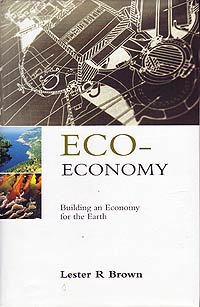 Eco-economy - Building an Economy for the Earth
Eco-economy - Building an Economy for the Earth
Lester R. Brown, President of the Earth Policy Institute
Here Brown, President of the Earth Policy Institute, a Washington, D.C.-based environmental research organization, argues for the development of an environmentally sustainable society.
First, however, he paints a clear picture of the problems we have created for ourselves with our unbridled productivist ethic.
This, in fact, takes a good deal of the space, and is no doubt a harrowing read for the reader new to our species' proclivity for destruction - and his style is clear and concise. He points out the ways in which the global economy is out of sync with the earth's ecosystem, and uses as evidence the collapse of the world fisheries; the shrinking of our forests; expansion of the world's deserts; erosion of soils; global plunge in water tables; and climate change, as rising temperatures lead to more destructive storms, melting glaciers, and rising sea levels.
Most of those who pick this up, though, will have a clear idea of the nature of the problem already. For most readers, then it will be Brown's prescriptive ideas that interest.
The plans he outlines include for example, utilizing solar and wind energy, and replacing our individualist transportation ideology with light rail and bicycles instead of cars. He also presents cogent evidence on the economic benefits of doing so.
It is his contention that "For the first time since the oil age began, the world has the technology to wean itself from petroleum coming from the politically volatile Middle East",and that "A combination of wind turbines, solar cells, hydrogen generators, and fuel cell engines offers not only energy independence, but an alternative to climate-disrupting fossil fuels". His new economy, the "eco-economy", will see the replacement of climate-disrupting fossil fuels with renewables, and of the throwaway society with a recycling economy. As a counter to the charge that this is errant optimism, Brown notes that these ideas are already gaining ground, even in the oil state, Texas!
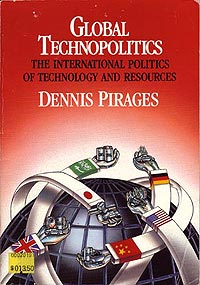 Global Technopolitics
Global Technopolitics
Dennis Pirages
Pirages has been at the cutting edge of global environmental politics for much of the last three decades, having published Global Ecopolitics [MA Duxbury Press] as long ago as 1979. His latest book, out in June 2003, Ecological Security: An Evolutionary Perspective on Globalization [co-authored by Theresa Manley DeGeest], no doubt will continue the tradition.
However, here we will look at his 1989 book Global Technopolitics. Concern over, for instance, water pollution, air pollution, and deforestation have loomed large in the environmental movement. He has, across his work, analyzed emerging demographic, ecological and technological discontinuities and the dilemmas associated with rapid globalization, and has long stressed the need for new kinds of global public goods to mitigate the harshest impacts of these changes.
Pirages work on "the international politics of technology and resources", as exemplified in Global Technopolitics, feeds into a broader ecological security agenda.
In many ways his work has been prescient - he mapped out many of the resource shortages that will shape the 21st century, and noted the inescapable fact that most of these exist in politically unstable parts of the world. Oil and other fossil fuels, of course, play a role in this, but, perhaps surprisingly to some, it is minerals that we take for granted that should concern us, such as bauxite and aluminum; copper; manganese; tungsten and zinc. In order to ensure supply of all these materials, and more, the US must increasingly depend on imports. Europe and Japan are even more dependent for most minerals, including iron ore.
As the rarer minerals dwindle, resource wars appear inevitable, and therefore are a matter of national security. The former Communist bloc has the majority of beryllium and platinum deposits. Africa has most of the world's cobalt. Latin America contains almost all supplies of the mineral Columbium...
Anyone reading this will have access to a computer - even supposing a clean and pain-free transition to a non-fossil fuel economy, we will soon be at each others throats over technologies we today take for granted. Even the most cynical and fearful of our commentators who critique the ecological problems facing us don't seem to have a handle on the true magnitude of those very problems.
Whilst many have spent time in the margins, yelling to be heard, a small handful of academics like Pirages have more clearly mapped our future, and, more importantly, tried to design pragmatic roads out of the chaos. Many will feel that an instrumentalist approach cannot but take the base causes of our crisis with us into the future, and so retain the seeds of our doom. However, it has to be said, better here tomorrow with more problems to face, than not here tomorrow at all. When this book first appeared, it sank without a trace - in the public domain. However, as a European reader, who acquired it initially through the British Library, it was clear that the book was having some real impact where it counts. The loan was for a maximum of three days, and I had to wait two months to get it - enquiries at Boston Spa made it clear why: half of Westminster was queued up to borrow it.
Meanwhile, the book is as relevant as ever, whether the exact statistics quoted have shifted in the intervening decade of not.
 The Ecology of Eden: Humans, Nature and Human Nature
The Ecology of Eden: Humans, Nature and Human Nature
Evan Eisenberg
Humans suffer from a particular malady, the almost universally held belief that sometime "before" or in some "other place", we (and all other species) lived in harmony and balance. The predominant variant that Europeans and Americans have is the Christian idea of Eden.
In Ecology of Eden Eisenberg shows how this impulse can be positive, fuelling our attempts to remake the world for the better - a better world modelled on our dreams of a Golden Era in the past. He notes, also, how this harking back can lead to inaction and wishful thinking. Yet, in the main, he sides with the former interpretation of the idea of Eden.
In doing so, the book shows how the contradictions in the relationship of the human and the natural define a "central controversy of ecology": the conflict between the deep ecologists, who dream of returning to Eden, restoring a state of harmony in which wilderness reclaims the Earth; and the managers, who dream of a man-made paradise, one that presumes a harmony between the best interests of humans and their planet.
Man may be capable of becoming stewards to the planet by either route. Both tendencies have something to bring to the feast, if they can only listen to each other. However, the green movement has a liking for polarized extremes, and so the deep ecologists and the environmentalists won't have a pow-wow. Yet doing so is all that can make us strong enough to win the day.
Perhaps unfortunately, Eisenberg seems to be willing to fall into a Gaia-loving "earth can absorb our blows" headspace, and thus merely fuels the quietists even though his message does not prescribe such. Perhaps he listens to too much, and romanticizes too much, Jazz [you had to be there, but then again, don't].
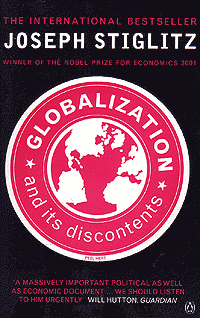 Globalization and Its Discontents
Globalization and Its Discontents
Joseph E. Stiglitz
Stiglitz is a Nobel prize-winning economist and was once a member of President Clinton's Council of Economic Advisors, followed by three years as chief economist and senior vice president of the World Bank.
Thus it should be no surprise that Globalization and Its Discontents is NOT the anti-globalization tract that, somehow, the world has taken it to be. What he does do is clearly explain the functions and powers of the main institutions that seek to govern globalization - the International Monetary Fund, the World Bank and the World Trade Organization. He looks, too, at the ramifications, both good and bad, of their policies.
Stiglitz's book is, in fact, an endorsement of market economies. He strongly believes that globalization can be a positive force, particularly for the poor. He is good enough to accept that this can only be so if the IMF, World Bank and WTO dramatically alter the way they operate. To this end, he advocates increased transparency and a greater willingness to examine their own actions more closely.
This understates things of course. In reality the IMF has caused mayhem with its advocacy of free market doctrine. Post-Communist Russia was shattered in it's capitalist experiment, though, perhaps, like a phoenix it may arise. IMF fiddling in Asia almost crashed the world economy. However, it is easy to see regulation of the instruments of global markets as a solution in itself, and to forget the sheer unadulterated greed exhibited by individuals that truly builds our productivist / consumerist endgame.
"Globalization with a human face" is not to be found by channelling men's greed in a controlled free market [whatever one of those is], but is rather to be found in a more radical area - the conflation of internationalist socialism, anarchism, and social ecology.
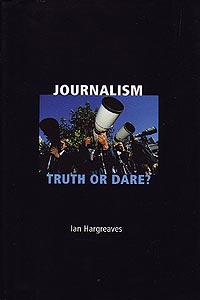 Journalism: Truth or Dare?
Journalism: Truth or Dare?
Ian Hargreaves
"Almost everyone reads the newspaper, browses the Internet, listens to the radio or watches TV. Journalism has an indelible effect on our worldview - from the fight against global terrorism to the American presidential elections, celebrity scandal and the latest environmental coups. Ian Hargreaves uses his position within the media to examine how we get this information and the many practical, political and professional decisions that the journalist has to make, as part of the process of delivering that information to us.
"Is journalism the "first draft of history" or a dumbing-down of our culture and a glorification of the trivial and intrusive? In this text Hargreaves argues that the core principles of "freedom of the press" and the necessity of exposing the truth are as vital today as they ever were."
Here is a book that seemed timely on publication, but, with every day that passes post-Iraq, it seems more and more premature. There is no doubting the rectitude of bringing the amibiguities of the journalist's role into the light of day, and of pointing a worried finger at the lily-livered approach of US journalists in particular to "truth". But if he could have held off a month or two longer... Patriot Act II, and it's post-war fallout may have made Hargreaves state things more strongly. And, let's face it, this is now a book with a wider potential audience than it had when it was completed. On publication the war was so underway that most of the opposition had gone home to sulk.
A paperback issue should bridge the gap - I hope Hargreaves does revise it accordingly, as I think he would do a fine, if low-key, job.
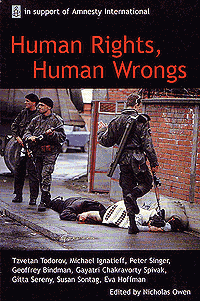 Human Rights, Human Wrongs: Oxford Amnesty Lectures
Human Rights, Human Wrongs: Oxford Amnesty Lectures
Nicholas Owen (Editor)
It is the nature of right-thinking middle-class bourgeoise events such as the Oxford Amnesty Lectures to avoid forceful rhetoric, and to call a spade not a spade but a digging implement. Here, writers such as Tzvetan Todorov, Michael Ignatieff, Gayatri Spivak, Peter Singer, Gitta Sereny, Geoffrey Bindman, Susan Sontag, and Eva Hoffman all have a bash at the preconceptions behind the moral complexities of human rights questions. Niall Fergusson, Timothy Garton Ash, Hermione Lee, and others provide commentaries on there lectures. The question is, can they shake it up, or will they merely spout the same old cold platitudes that few of us will disagree with, but that will fire few of us up?
In this lecture series human rights issues addressed include, the right of the international community to military intervention in human rights abuses, the ethical and legal difficulties in bringing rights abusers to justice, the human tendency towards racist attitudes, the impact of postcolonialism, and the way in which human evil is represented in photography.
The stated aim is to "do justice to the moral complexity of the situations into which those caught up in violent or destabilizing events are placed, while retaining a commitment to action as well as understanding in support of human rights". The outcomes are as expected - interesting, but a little bland, a little worthy.
The most interesting essay, in some ways, is Eva Hoffman's The Balm of Recognition, which addresses the concept that those who have suffered abuse can find partial relief or redemption through retrospective acknowledgement, from the outside world, of their plight. Relief here is also available to the following generation of the abused, via pressure from the world community to rectify wrongs across generations. Perhaps inevitably, Hoffman concentrates mainly on the Jewish Holocaust. But the 20th century has been a palimpsest of holocausts, leaving many other minorities in need of the balm of recognition, too. Hoffman's ideas are quite univeralizable, and therefore welcome to all the oppressed. And, in fact, she herself acknowledges this by making [brief] reference to former Yugoslavia and to Rwanda.
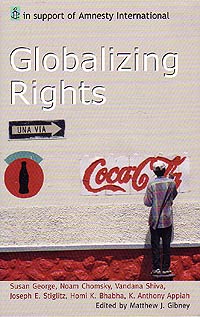 Globalizing Rights: Oxford Amnesty Lectures
Globalizing Rights: Oxford Amnesty Lectures
Matthew Gibney (Editor)
The free marketeers would argue [disingenuously, in many cases] that the causes of human rights abuses are not too much capitalism, but too little. If only, they say, global markets were more developed. If only the obstacles facing global investment could be removed...
This is the Ayn Rand / Thatcher doctrine - "of course things are worse under this partial capitalism: if there were no fetters on trade everything would be rosy in the garden."
In reality, the widening gap between rich and poor not only produces a sense of relative deprivation amongst peoples' in growing economies who in fact have it better than ever before... In reality, the poor in many countries are objectively more impoverished than ever under the capitalist gun.
Again: It is the nature of right-thinking middle-class bourgeoise events such as the Oxford Amnesty Lectures to avoid such forceful rhetoric, and to call a spade not a spade but a digging implement. Here, writers such as Noam Chomsky, Kwame Anthony Appiah, Homi Bhabha, Susan George, and Joseph Stiglitz, and Richard Rorty all have a bash at the preconceptions behind the neo-liberal faith in development. The question is, can they shake it up, or will they merely spout the same old cold platitudes that few of us will disagree with, but that will fire few of us up?
In an era of global communications technology many hoped that a Global Village of benign western values would emerge. This hope was one that united left and right, and the hard fact that this very freedom of movement also allowed bomb recipes to be swapped quicker between nations, and purveyors of earth-moving equipment to make bids on backwater third-world dam projects they previously would never have heard of, rankles.
It is however a reality. And global markets require these freedoms, the good and the bad of them, in order to operate. This makes it easy to show that they do not hold the solution to human rights questions, but in fact raise their own.
Globalizing Rights will be ambiguous. The western capitalist agenda requires a more or less free flow of data, whilst aspects of it's ability to make profits require rights to be relativized as much as possible. Global markets do not lead to more humanity, or to a tendency to avoid oppression out of fear of disdain from the world's media. They may, however, determine a different target for abuse. Rather than oppress your own neighbours for power, oppress another places inhabitants for profit. If big money cannot get on without human rights being abused, as with the Ogoni in Nigeria, then human rights will be abused.
The liberal aspect of the western agenda, of course, travels with the markets, as information flows. We can force our economic ideologies on the third world, then, hey, we can force our rights on them too. Both are imperialist impulses from someone's point of view. We decide to call one good, the other bad, but it isn't our call. In the knowledge that this is so, we still applaud Amnesty and NGO's like it. Cos' they're the only game in town, so far as we can see... And there is the problem on the internet and in international communications. The english language means the flow is too often one-way. No-one is listening to the oppressed in the countries we want to save - if we did listen, too many of them are clamouring for a TV.
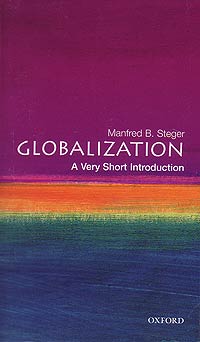 Globalization: a Very Short Introduction
Globalization: a Very Short Introduction
Manfred Steger
In this addition to OUP's admirable and fast growing series of Very Short Introductions, Illinois State professor Manfred Steger introduces the large subject of Globalization.
He sees globalization as a multifaceted process encompassing global, regional, and local aspects of social life. In addition to explaining these various dimensions, he explores whether globalization should be considered "good" or "bad".
His overall conclusion is that globalization is not so monolithic as some fear, and that recent events in global terrorism may trigger a return to isolationism in, at least, that behemoth of global free marketeering the USA. Of course, events since publication make this less likely, and the sheer fact of inequalities in global resourse distribution strongly mitigates against a return to Fortress America.
By "globalization", Steger means what we expect him to mean. He in fact gives a detailed set of definitions leading to what we all think of as globalization. I think, though, that words are important here. The meaning he gives suits globalizers and anti-globalizers. But it misses the chance to acknowledge other "globalization" agendas. The anti-globalization movement really needs to change it's name, as most of the people who come under the moniker, when pushed on their own moral values, wholeheartedly embrace some other form of, you guessed it, globalization. And those who enact "globalization" by the accepted definition make all opposition look blinkered and insular just by being able to say that they have no global values, only NIMBY ones - which is patently false, but so mirred in the mere name that no-one needs argue it, and no-one sees to question it!
Nonetheless, this is a useful little book, within the narrow definition of "globalization". Steger illustrates the text with numerous graphs, all too many of which put the lie to the neo-liberal claim that free market ideology will lead to wealth for all, by showing exponential growth amongst the haves at the expense of the have-nots
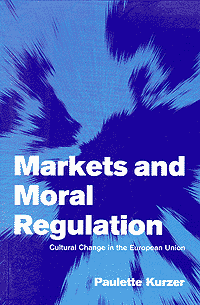 Markets and Moral Regulation: Cultural Change in the European Union
Markets and Moral Regulation: Cultural Change in the European Union
Paulette Kurzer
"Does European integration influence national cultures and social policies? Is Europe's fabled cultural diversity diminishing?"
Kurzer seeks to analyze the effect of EU wide agendas on local culture via case-studies in moral regulation in member states. She looks at the Scandinavian anti-drink culture, the anti-abortion culture in the Republic of Ireland, and the decriminalization of drugs in Holland. Each of these is a cultural expression that is out of wack with European morality. In looking at the effect of integration on such provincial questions she seeks to draw conclusions on cultural diversity.
Perhaps not surprisingly, the conclusion is, broadly, that EC/EU market integration is in fact bringing about a convergence in European morality norms. The agency of change here is identified as European law, and its role as a market regulator. Kurzer says that as market forces invade these cultural and moral spheres, protective barriers disintegrate, with the result that cultural and social norms are exposed to the influence of "market competition".
The conservative reader will conclude that integration is bad, and the liberal reader will conclude that it is good. However, the rise of the right in many European countries indicates that in no way is integration and its effect on local morality a forgone conclusion.
My concern is that surely law is the instrument of the market forces and not the other way around. If the moral values that all forward thinking individuals agree on were to become more deeply entrenched Europe-wide, then fine [if we can agree on which ones, natch]. However, surely the universalized values will be those of the free market, where ethical fetters are to be removed regardless of negative effect on the fine infrastructure of a community, as they interfere with profits.
Thus, the end result should be the promotion of alcohol consumption in Finland and Sweden, support for some decriminalization of drugs across Europe, and no opinion on RoI, with an expectation that they'll liberalize anyway. That is to say, integration of markets should lead to unfettered trade. A Europe integrated through its legal and ethical traditions is the reverse of what we'll get / are getting.
In so far as this is a war between Old Europe and the New World for global dominance, the US must love Maastricht and Nice, as they further the economic destruction of community values - the reverse of what European Union should mean.
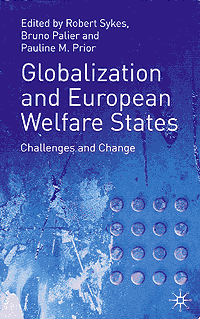 Globalization and European Welfare States: Challenges and Change
Globalization and European Welfare States: Challenges and Change
Robert Sykes, Bruno Palier, Pauline Prior (Editors)
The editors goal in compiling these essays is to counter speculation about the impact of globalization on welfare states. Their thesis is that, whilst globalization processes do exist, their link with welfare change is complex, and varies both between countries and types of welfare state. As John Clarke, quite reasonably, puts it in his essay Globalization and Welfare States: Some Unsettling Thoughts, "the EU has been a force for globalization; a defence against globalization and a response to globalization".
Undoubtedly, this is for several reasons, including Europe as instigator of the capitalist economic agenda [the very one some seek to defend Europe against now that European States find that they are not the only, nor the best, players in town]; southern catholic states as repositories of communitarian values imperilled by globalization; northern industrial states as wannabe future contenders in the global market; fearful Scandinavian states whose fundamentally NIMBY-socialist fingers were burnt in late-eighties deregulation; stupid Brits with whistful dreams of empire blinding them to the need to chuck out most of the Maastricht and Nice treaties and to cling desperately to the Social Charter...
That the editors conclusion leaves a lot to be desired may be expected. However, it is surely laughable to conclude, as they do, that "there is no evidence [...] of a direct and essentially similar impact by globalization on European welfare states. Changes which have occurred, though they may have been indirectly related to globalization, have been mediated through national governmental policies and institutions, a process that has led to quite different outcomes."
Certainly, the extact manifestation of welfare state destruction in any given member state may be different to that in another due to many factors, including that the state has to mediate that destruction. But it in no way means that globalization greed is any less the prime mover behind the government policy. For example, the PFI privatization crusade in the UK seems straight out of the globalization songbook. That a more socialist or communitarian government might put up more of a fight, does not change the fact that the impact of globalization on any welfare provision that gives aid according to need rather than means to pay [ie, that is welfare provision] can in principle only be negative.
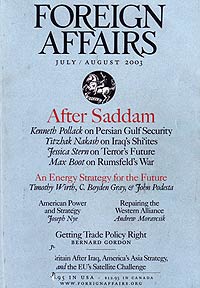 Foreign Affairs
Foreign Affairs
US Journal
The July / August 2003 edition of the American Foreign Affairs journal, "After Saddam", looks at the world through blinkers.
The writers are all very good, and often intensely disagree with one another, but the bottom line is that all their different perspectives face the same way. The meaning of 9/11; of Iraq; of resource depletion... is not and never could be about the legitimacy of the Amerikan vision of a world order. Oh, no.
Every "answer" to every "problem" is defined in terms keeping with the program of resource depletion; productivism; free markets; globalization; and the good old USofA as being the only truly free people who can therefore always speak for everyone else - and when everyone else disagrees, the USA will have no real self-doubt [well - BOOM! - only for a very short moment], and will decry the "false consciousness" of those who seek to check them. As the only free people we can speak on your behalf, and if you struggle, "well it's for your own good, cos your wrong baby, so wrong".
Didn't the Marxists once suffer from this same delusion [vanguardism due to the false conscious of others]? Democracy is fine so long as everyone agrees on what USA agrees on. Venzuela must be suppressed not because they are not democratic, but because they democratically don't want to be taken over and squeezed dry by Amerikan capital.
Similarly, the answer to foreigners disliking them isn't to GET OUT OF THEIR FACE, but to feed them more Amerikan propaganda in the hope they'll see their just misguided. And when the reaction is to BLOW UP Amerikans? "Squash 'em like a bug, ungrates!"
Environmental degradation and resource depletion? "Well, see our guns are bigger'n'yours so now those scarce resources are OURS, see?"
It is no surprise that there is no vision in the Foreign Affairs journal, no questioning of fundamentals, and indeed a good deal of gung-ho optimism. It is after all the American way. However, read the journal. It's good for the soul to get a good hard glimpse of the enemy from time to time. Of course, the worst thing is how terribly confused and hurt they'll be if they read this [the ones that don't just reach for a gun], because they really can't see that they are the new Reich.
 The Prize: The Epic Quest for Oil, Money and Power
The Prize: The Epic Quest for Oil, Money and Power
Daniel Yergin
This is now an old book. It won Yergin the Pullitzer in 1991. However, not only was it great then, but it is still great. And recent events have reminded us all of its relevance.
In The Prize Yergin follows the historic role of oil from the first wells in Pennsylvania to the aftermath of the First Gulf War, illustrating exactly how this natural-resource has shaped the entire world economy, and international politics, for the last century.
As such, the book is as much a history of the modern world as it is a history of the oil industry. No better illustration can there be of the perils and evils of capital and the freeing of markets than the story of Shell, a company forged in defiance of US monopolies by a Jewish London trader - Rothchild connections; Russian oil; Dutch petrolium concessions in the East Indies; the inside story of North Sea Oil, and its role in undermining OPEC...
The final reason to read this book, however, is to appreciate the shadow that is thrown upon the future of "civilization", built as it is on fossil fuels. The next energy crisis will be deeper than we can imagine, delusions about hydrogen and desperately dangerous nuclear plans or not. And the early history of oil really lets us know what a hell greedy grabbing desperate people can forge when they get down to it. The West, at least, has been wrapped in cotton wool so long it'll simply die of shock when the crisis bites.
|

 Eco-economy - Building an Economy for the Earth
Eco-economy - Building an Economy for the Earth
 Global Technopolitics
Global Technopolitics
 The Ecology of Eden: Humans, Nature and Human Nature
The Ecology of Eden: Humans, Nature and Human Nature
 Globalization and Its Discontents
Globalization and Its Discontents
 Journalism: Truth or Dare?
Journalism: Truth or Dare?
 Human Rights, Human Wrongs: Oxford Amnesty Lectures
Human Rights, Human Wrongs: Oxford Amnesty Lectures
 Globalizing Rights: Oxford Amnesty Lectures
Globalizing Rights: Oxford Amnesty Lectures
 Globalization: a Very Short Introduction
Globalization: a Very Short Introduction
 Markets and Moral Regulation: Cultural Change in the European Union
Markets and Moral Regulation: Cultural Change in the European Union
 Globalization and European Welfare States: Challenges and Change
Globalization and European Welfare States: Challenges and Change
 Foreign Affairs
Foreign Affairs
 The Prize: The Epic Quest for Oil, Money and Power
The Prize: The Epic Quest for Oil, Money and Power